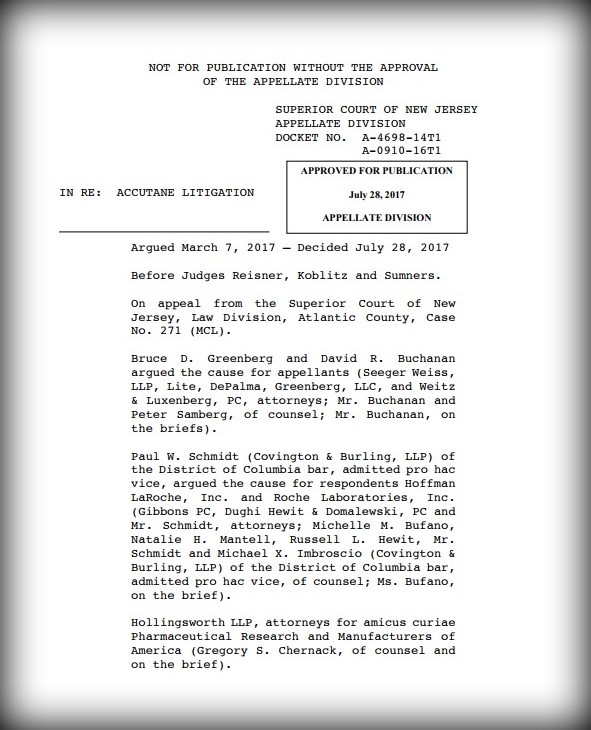 The Appellate Division has issued a significant published opinion in the ongoing legal battle over the acne drug Accutane. Over 2,000 claims were revived by this decision. If upheld by the New Jersey Supreme Court, the long-term effects of the decision will be even more noteworthy, as it all but eliminates the existing, critical gate-keeping role of trial court judges on admissibility of expert testimony.
The Appellate Division has issued a significant published opinion in the ongoing legal battle over the acne drug Accutane. Over 2,000 claims were revived by this decision. If upheld by the New Jersey Supreme Court, the long-term effects of the decision will be even more noteworthy, as it all but eliminates the existing, critical gate-keeping role of trial court judges on admissibility of expert testimony.
The Case
The Accutane cases have been winding their way through the New Jersey court system since being designated as Multicounty Litigation (MCL) in 2005. Plaintiffs allege that the acne drug Accutane causes inflammatory bowel diseases, including ulcerative colitis and Crohn’s disease.
Admissibility of Expert Testimony in the Crohn’s Disease Cases
The Appellate Division panel of Judges Reisner, Koblitz and Sumners overturned Superior Court Judge Nelson Johnson’s decision to bar testimony by plaintiffs’ experts and dismiss some 2,000 cases that relied on that testimony.
The panel held that plaintiffs are entitled to present their experts’ testimony, and remanded the case for trial. The court found that the trial court had gone “beyond its gate-keeping function,” taking “too narrow a view in determining whether the experts were using accepted scientific methodologies to analyze the evidence, and improperly determined the weight and credibility of the experts’ testimony.”
Although the courts have been inconsistent in their adherence to existing New Jersey Supreme Court precedent as prescribed in Landrigan, this Accutane ruling is a significant departure from existing case law.
Landrigan requires not only that the methodologies and data are of the sort relied upon by experts in the field, but also that “the relevant scientific community accepts the process by which [the expert] reasoned to the conclusion, and calls on the judge to “examine each step in the expert’s reasoning.”
The Appellate Division in this case held that as a matter of law, the trial court judge is actually precluded from exercising that degree of scrutiny, and instead must permit the expert to testify so long as he or she relies on the type of data and information reasonably relied upon by experts in the field, and offers some sort of explanation to justify that reliance, regardless of whether it involves a reliable and consistent methodology.
If upheld, this new standard would make New Jersey an extreme outlier on the admissibility of expert testimony. The federal courts and the vast majority of other state courts currently require a two-step process, as described by the U.S. Supreme Court in Daubert and codified in the federal rules. The judge must determine not only that the testimony is the product of reliable principles and methods, but also that the witness “has applied the principles and methods reliably to the facts of the case.” Under the Appellate Division decision, that sort of rigorous scrutiny would be precluded as a matter of law.
Limiting the judge’s role to excluding obvious “junk science” also misses the need and rationale for setting a higher standard of reliability for expert testimony. Even well-credentialed scientists should not be permitted to speculate based on incomplete data using inconsistent methodologies.
While the Appellate panel took exception to Judge Johnson’s characterization of plaintiff’s experts as “hired guns,” the “hired gun” phenomenon is precisely the reason rigorous gate-keeping on expert testimony is an essential judicial responsibility. Experts in litigation are not neutral advisers. Parties to litigation control the selection of expert witnesses, and choose those willing to testify to their party’s theory of a case. That “adversarial bias” means juries are typically presented with a biased selection of expert opinion. It therefore falls to the courts to filter unreliable testimony and ensure that the opinions jurors hear are based on reliable methodologies, applied consistently and reliably to the underlying data.
The abdication of the gate-keeping role is likely to make the New Jersey courts a magnet for out of state plaintiffs, an effect amplified by the U.S. Supreme Court’s recent Bristol-Myers Squibb decision, which significantly limited venue options for litigants. Already known for its inconsistent standards for expert testimony, an outright prohibition on the sort of rigorous scrutiny applied almost everywhere else in the country would make New Jersey the jurisdiction of choice nationwide for claims based on unreliable expert testimony.
What’s Next?
Roche has already announced that it will appeal this decision to the New Jersey Supreme Court. The New Jersey Civil Justice Institute will continue to provide updates as the cases progress.
If you have questions or comments about this litigation, please contact Alida Kass.

Leave A Comment